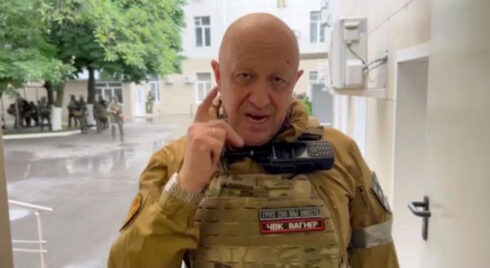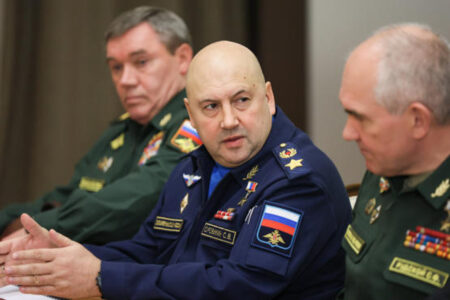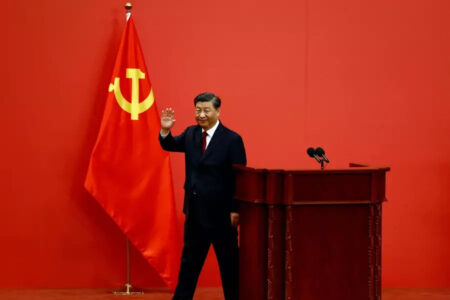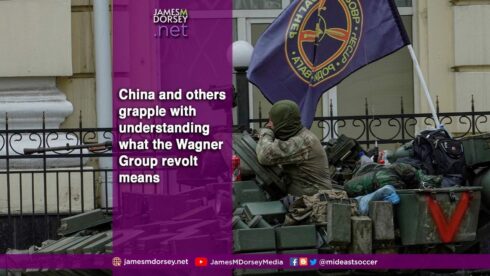Written by James M. Dorsey
The sigh of relief in a swath of land stretching from China to Africa’s Atlantic coast was audible when Yevgeny Prigozhin, a Russian oligarch who heads the Wagner Group, a state-funded private military company, called off his mutiny against President Vladimir Putin’s military and security establishment.

Founder of Wagner private mercenary group Yevgeny Prigozhin speaks inside the headquarters of the Russian southern army military command center, which is taken under control of Wagner PMC, according to him, in the city of Rostov-on-Don, Russia in this still image taken from a video released June 24, 2023. Photo: Press service of “Concord”/Handout via REUTERS/File photo
So were the concerns and unanswered questions the revolt raised about Mr. Putin’s grip on power and the risks involved in the global rise of private military companies in the minds of Chinese, Central Asian, Middle Eastern, and African leaders.
The core question is the Russian military’s role. It remains unclear whether the military held back on Mr. Putin’s orders or hedged its bets. Also unanswered is whether Mr. Prigozhin enjoyed support from within the military ranks.
Russian military personnel surrendered without a fight when Mr. Prigozhin took control of Rostov-on-Don, a city of one million people and home to the headquarters of Russia’s Southern Military District, widely viewed as one of the military’s most competent units.
Similarly, Wagner fighters advanced along the M4 expressway to within 200 kilometres of Moscow, with no attempt by the military to stop them. A Deutsche Welle fact check of videos circulating on social media allegedly showing the Russian Air Force bombing Wagner on the M4 concluded that they were fake.
”Where was the Russian Air Force? Wagner may have had tanks, lightweight anti-aircraft systems, and some ground-to-air missiles, but long-range anti-missile and anti-aircraft defences have not been part of their modus operandi. Consequently, the mercenary convoys en route to Moscow could have been vulnerable to aerial assault,” said Alessandro Arduino, an authority on private military companies.
The question marks are compounded by reports that General Sergei Surovikin, the former top Russian military commander in Ukraine, knew in advance of Mr. Prigozhin’s planned revolt.

Sergei Surovikin, center, then commander of the Russian Aerospace Forces, during a meeting in Sochi (Russia). Photo: MIKHAIL METZEL /TASS /SIPA USA
Another senior military officer, Lt. Gen. Vladimir Alekseyev, appeared on video chatting with Mr. Prighozin after the Rostov-on-Don takeover. In addition, General Valery Gerasimov, the military’s chief of staff and a target of Mr. Prigozhin’s ire, has not been seen in public since the failed revolt.
To be sure, Messrs. Surovikin and Aleseyev issued separate videos criticizing Mr. Prigozhin and calling on him to halt his revolt.
In addition, Putin sent a brigade loyal to Chechen leader Ramzan Kadyrov rather than a Russian military unit to Rostov-on-Don to confront the Wagner Group. Even though it did not come to a clash, Mr. Kadyrov is likely to see the mutiny as an opportunity to replace the Wagner Group.
Without answers to the questions, Mr. Putin will be hard-pressed to demonstrate unity among Russia’s military and political elite and that he retains complete control. That will affect foreign leaders’ assessment of Mr. Putin as a reliable and stable partner.
The Wagner revolt and questions about Mr. Putin’s grip on power have diminished Russia’s status as a credible security partner that has already been called into question by its inability to subjugate Ukraine.
In addition, Mr. Putin’s foreign friends in China, Eurasia, the Middle East, and Africa have long felt uneasy about the Russian invasion of Ukraine, even if they were not condemning it publicly or adhering to sanctions imposed by the United States, Europe, and others.
Except for China, mediation proposals by African leaders, Indonesian President Joko Widodo, Turkish President Recep Tayyip Erdogan, and former Israeli Prime Minister Naftali Bennett were primarily intended to demonstrate neutrality in the Ukraine conflict.
So was China’s plan, but China plays in a different league because many view it as the only power with real influence in Moscow.
China has sought to capitalise in Central Asia on Russia’s diminished status, where Russia was long seen as the region’s security guarantor, and US neglect of the former Soviet republics.
In May, President Xi Jinping unveiled a grand development plan focused on infrastructure and trade at a meeting in Beijing with the leaders of the five Central Asian states.

Chinese President Xi Jinping waves after his speech as the new Politburo Standing Committee members meet the media following the 20th National Congress of the Communist Party of China, at the Great Hall of the People in Beijing, China October 23, 2022. Photo: REUTERS/Tingshu Wang
Rather than wanting to replace Russia, China hopes to emerge as the dominant power in the region with Russia as its junior partner.
If Ukraine wasn’t enough of a headache, uncertainty about Mr. Putin’s status is compounded by a lack of clarity about the future of the Wagner Group, particularly in the Middle East and Africa, where the Russian company may be first among equals, but Chinese and other private military companies also operate.
Russia’s defense ministry may be able to control the group in Ukraine and Syria but could find subjugating Wagner more difficult in Africa. In contrast to Ukraine and Syria, countries with a strong Russian military presence, Russia has far fewer, if any, forces in the African nations where Wagner operates.
Wagner has little incentive to surrender its positions in Africa, where it generates income from bolstering governments and warlords and lucrative mining deals. Wagner operates in Libya, Mali, Sudan, the Central African Republic, Chad, Mozambique, and Madagascar.
Media reports said an unknown drone had attacked a Wagner base in Libya south of the rebel-held city of Benghazi days after the mutiny. Wagner positions in Syria were reportedly raided by Russian troops, detaining commanders of the group.
Nevertheless, Wagner, acting independently, could be a concern for Chinese private military companies on the African continent.
In contrast to Wagner, which effectively operates as a mercenary and combat force, Chinese companies, like Beijing DeWe Security Service, Huaxin Zhong An Security Group, and China Security Technology Group, serve primarily as protectors of Chinese investments, assets, and personnel. As a result, they have little contact with Wagner.
Mali could emerge as a test case of what Wagner’s post-revolt positioning could mean for Chinese companies. Mali has expelled United Nations peacekeepers scheduled to withdraw from the country before the end of this year, relying instead on Wagner.
In 2021, Malian security forces freed three Chinese nationals abducted by unknown gunmen from a construction site in the country’s north. In the future, China may have to turn to Wagner in an emergency if it does not deploy its own private military.
Moreover, Russia’s experience with Wagner raises the spectre of military forces revolting against ruling elites when many in China, Central Asia, the Middle East, and Africa believe that the era of popular revolts has run out of steam.
That may not be an immediate domestic concern in China, but it is a worry given China’s preference for stability in countries across Eurasia, the Middle East, and Africa, with which it maintains close economic and other ties.
For now, China, like others, sighs in relief. However, the last word on the Wagner mutiny fallout has yet to be spoken.
Dr. James M. Dorsey is an award-winning journalist and scholar, a Senior Fellow at the National University of Singapore’s Middle East Institute and Adjunct Senior Fellow at Nanyang Technological University’s S. Rajaratnam School of International Studies, and the author of the syndicated column and blog, The Turbulent World of Middle East Soccer.





the war will start in middle east though, not in africa, and especially in the levant. when hts and pkk fade away then a new conflict will arise when russia and egypt support the secularists and turkey and iran support the islamists.
the russian admin is merely doing what the cia has been doing for decades in order to get a foothold in a country and then claim plausible deniability. the russian admin approach differs from the us as they don’t send drugged up religious fanatics. many african countries have already had a taste of shyster style democracy. even the un and their ‘peacekeepers’ can no longer be trusted. african countries could do worse than allow russian security to backstop their future.
russia supports the secularists there also.
propaganda. the chinese knew exactly what was going on.
the middle kingdom always plays a waiting game because it know ultimately it will absorb all enemies as its economic status grows and it is seen as a help not a hindrance throughout the third world.
putin couldn’t wait although the hand he was holding at the time was at least four aces. he had two pipelines and a virtually unlimited market as an indispensable trading partner throughout western european. why he made this huge miscalculation will be one of the mysteries of history. in the meantime china and israel will not cause putin to lose face. they won’t back him either but they won’t embarrass him.
he did that mistake because of his belief that the first to attack wins the fight. ukraine was about to launch the ethnic cleansing of dombass
wtf, everybody knows who won and who lost, the looser is the russian people, the winner is the jews, once again, sheklers talks bullshit walks, the war on ukraina is lied about by the rf and the west, and for a brief moment it looked as the zatos was concerned about putin, just a brief moment, interesting, but berried in haste with an massive barrage of bullshit about a coup. but hey, its just putains 12 d cheeees, right
nothing to see here. russian military stood back because wagner wasn’t a real threat. and the chechens were sent in because wagner are experts in urban fighting, but they are even better.